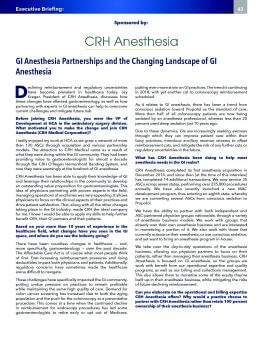Knowledge and resources that are second to none.
Our partnership with CRH Anesthesia has exceeded our expectations from day one. The team has been transparent and responsive to our questions along the way. Most importantly, CRH has delivered on its promise to bring value to our existing anesthesia program with its knowledge and resources that are second to none.
Gareth Weiner, MD Denver, CO
An opportunity all practices/ASCs should consider.
Developing an anesthesia service was a rewarding venture in all aspects for our practice, ASCs and patients. Forming a joint venture with CRH resulted in further improvements in our anesthesia operations, billings and collections, contracting and CRNA management. Moving to an anesthesia JV is an opportunity all practices/ASCs should consider.
Dr. Bergein Overholt, Knoxville, TN
The transition to CRH Anesthesia was seamless.
We have had a great working relationship with CRH for a number of years and were the first to join their anesthesia partnership program when it was introduced in late 2014. The transition to CRH Anesthesia was seamless, and both our practice and patients have benefitted from teaming up with a company we know and trust.
Dr. Steve Morris, Atlanta, GA
We are pleased we have a new partner in our anesthesia business
Negotiating any transaction often causes angst and anxiety among buyer and seller alike. Not so with our recent transaction with CRH. Despite the complexities of our arrangement, we were treated with fairness and respect throughout the process and we are pleased we have a new partner in our anesthesia business.
Dr. Bruce Levy, Austin, TX
